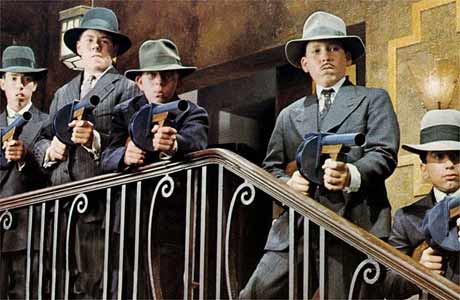

Now, more spoilers.
At the end of the film, absolutely everyone is creamed. After a few discussions, they start singing together, everyone getting along. Previously splurged characters return for this final, happy reunion.
Now, is that really so different from Heathers? It seems to me that it's a perfectly valid interpretation of Bugsy Malone, to assume that everyone died at the end and got along better in heaven.
Bartelmy; making child-friendly films mildly disturbing since 1988.
Saturday, 4 July 2009
Bugsy Malone and Heathers
Wednesday, 7 January 2009
Let Me Be Surprised
The throb, the thrill,
I've never been there,
But someday I will.
Adventure and danger,
Love from a stranger,
Ladadadada...
Today there's sun,
They said there'd be snow,
It's fun not to know.
What keeps my heart humming,
Is guessing what's coming,
Let me be surprised.
The world seems mirthless,
You feel worthless,
Oh Charlie, please remember,
Down there's a world of used cars,
And single's bars,
Not for this Rover,
I don't like to steal,
But I don't buy this deal.
In about three seconds, she'll have realised...
And she's gonna be...
Charlie, what are you doing?
Wait'll you see...
What's that you have behind your back?
She's gonna be...
Charlie, don't wind that watch!
Surprised....


Tuesday, 25 November 2008
Things Look Scarier from Three Feet High
One simple thing should always be remembered, when deciding whether to allow children - your own or anyone else's - to watch a film. And that is that children are smaller, have much shorter concentration spans, and tend to feel things more intently.
When I was younger, watching a film used to seem like a huge commitment. Sitting still and paying attention for a whole hour and a half? That's a skill that comes with time.
When I was even younger than that, say three or four, films were an incredibly intense experience. And what I remember most about them, years later, is how scary they were. Like The Little Mermaid, for instance. My strongest memory of that film was the deep purple water during the storm at the end, when Ursula was taking revenge. And the golden signature Ariel made. That's what made the most impression on my young mind. It makes no difference that, together, they made up barely fifteen minutes of a ninety minute film - that was what I remembered.
Even worse was All Dogs Go To Heaven, which was released a year after I was born. I must have been three or four the first time I saw it. The film was released with a G rating in America, and a U rating in the UK. This was after removing the word 'damn', cutting a few minutes from the nightmare in hell scene, and removing the shot of a car hitting the main character (a dog named Charlie B. Barkin, voiced by Burt Reynolds).
The film was released with a G rating in America, and a U rating in the UK. This was after removing the word 'damn', cutting a few minutes from the nightmare in hell scene, and removing the shot of a car hitting the main character (a dog named Charlie B. Barkin, voiced by Burt Reynolds).
The first line of IMDB's plot summary is as follows; A dog returns from the dead looking for revenge on his killer using an orphan girl who can talk to animals.
Let me repeat that.
A dog returns from the dead looking for revenge on his killer using an orphan girl who can talk to animals.
...yeah.
There's also a crocodile, someone who is executed by being strapped to an anchor and lowered to some kind of snapping thing (possibly the same crocodile, it's been a while), begging to be released the entire way down, someone is hit by a car, and the devil comes for the hero's soul at the end.
Also, the voice actress, Judith Barsi, who voiced Anne-Marie, was shot around a year and a half before the film was released. Which isn't really relevant to how scary the plot is, but adds an extra surreal effect when watching it as an adult.
So, yeah. Childrens films are scarier to children than they are to adults. And All Dogs Go to Heaven is to children's films as Heathers was to teen movies.
Which isn't to say that I don't adore All Dogs Go to Heaven - just that it utterly terrified me, far beyond the range of what an adult might have expected.
